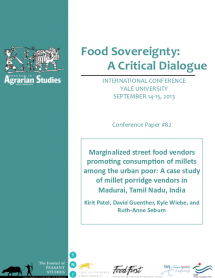Ideas into movement
Boost TNI's work
50 years. Hundreds of social struggles. Countless ideas turned into movement.
Support us as we celebrate our 50th anniversary in 2024.

While Indian Policy makers have claimed that the number of people leaving below the poverty line has been reduced, a spatial analysis of poverty data reveals that most of the gains achieved have been concentrated within rural areas while the urban poor continue to experience abject poverty, food insecurity and malnutrition.

Although the global food sovereignty movement have been instrumental in attempting to eliminate these urban disparities by promoting right to food legislation, an analysis of existing state - led food security measures indicates an inherent rural bias in these programs.
These state - led programs provide little opportunity for participation of the urban poor, beyond being passive recipients of subsidized surplus grains. The current policy reforms under the new Indian food security act continue to ignore the potential role of the urban informal sector, which provides employment to the majority of urban poor in procuring, transporting, processing, and delivering raw agricultural produce as well as ready - to - eat food.
The lack of attention towards the urban informal sector by development scholars, policy makers, and food activists is perhaps ingrained in the ideal agrarian vision of the development from which these urban poor might have chosen or coerced to escape.
This study explores how the street food vendors (SFV), operated primarily by urban poor, improve access to nutritious foods and generates employment opportunities for urban poor in the state of Tamil Nadu, India. It embraces a new direction for the food security debate where the urban poor are not simply passive recipients of subsidized food, but become enabled actors of a food chain that provides nutritious food for the poor and other classes in the urban landscape.
The first section of the paper presents and in - depth analysis of the production, distribution, and consumption oriented food security initiatives implemented since the 1960s and highlights their limitations for addressing concerns of the urban poor.
The second part describes research objectives, methodology, and provides background of street food vendors in the city of Madurai, Tamil Nadu.
The third part focuses on the socioeconomic and cultural backgrounds of the street vendors as well as the uniqueness and diversity of food products they sell. A comparison of millet porridge vendors and street vendors selling other cooked ready - to - eat food products illustrates the unique role that porridge vendors play in providing the urban poor with access to a nutritious millet product.
An examination of business management and labour strategies reveals that although women are marginalized they play crucial roles in the street food industry. Finally, an analysis of consumer preferences and perceptions shows that consumers from all socioeconomic backgrounds are concerned with health and food safety issues.
The paper concludes with an analysis of the constraints faced by porridge vendors as well as suggestions for active engagement of urban poor in achieving food security.
Kirit Patel, Assistant Professor, International Development Studies Program, Menno Simons College affiliated with the University of Winnipeg & Canadian Mennonite University, Winnipeg Dr. Patel has extensive experience as an academic, development policy analyst, and community development practitioner. He is the principal investigator of an interdisciplinary research project, funded under the Canadian International Food Security Research Fund (CIFSRF) from the IDRC, examining production, distribution, value addition and consumption of small millets in India, Nepal and Sri Lanka. He can be contacted at k.patel@ uwinnipeg.ca.
David Guenther, Research assistant and administrative assistant for the CIFSRF project on food security in India, Nepal, and Sri Lanka
Kyle Wiebe and Ruth-Anne Seburn, Students in the IDS honours program, Menno Simons College, University of Winnipeg Kyle Wiebe and Ruth-Anne Seburn are both involved as student researchers in the CIFSRF project on food security and are writing their theses on issues related to street food vendors in Madurai
Food Sovereignty: a critical dialogue, 14 - 15 September, New Haven.